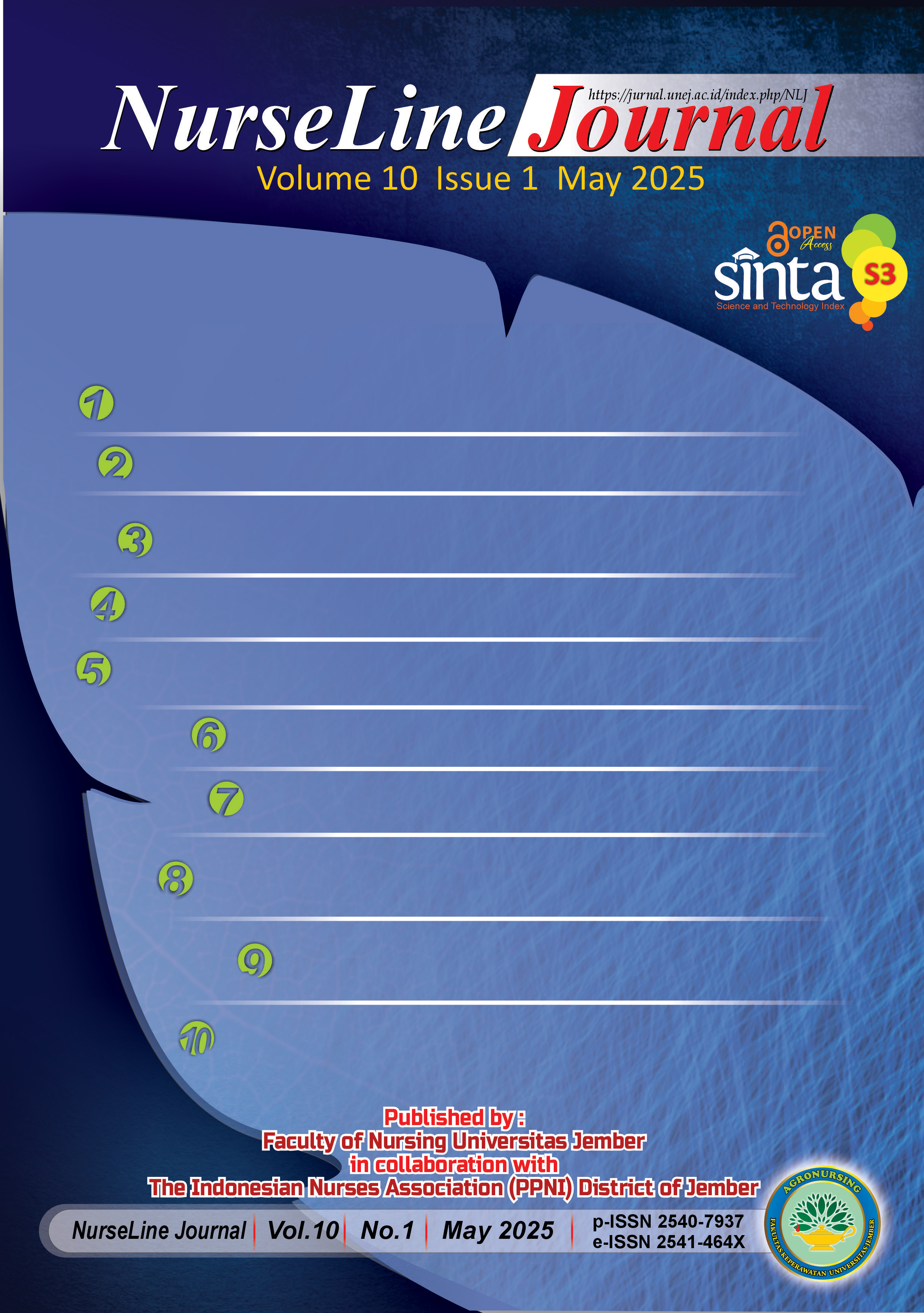Comparative Analysis of Psychological Well-Being Among Nurses And Patients In Hospital Care Settings: A Multisite Cross-Sectional Study
DOI:
https://doi.org/10.19184/nlj.v10i1.53699Keywords:
Cross-sectional studies; psychological well-being; nurse; patient; hospitalization.Abstract
Background: Psychological well-being plays a crucial role in health outcomes. The psychological well-being of nurses, who work in high-stress environments, has a substantial impact on patient outcomes and care delivery, even though patients' mental health frequently receives professional attention. Most studies have investigated the PWB of nurses and patients separately, however, the comparison between both groups in multisite clinical setting remains unclear. Objective: This study aims to explore if differences occur in the psychological well-being between nurses and patients during dyadic interactions. Methods: The design used in this study are multisite cross-sectional study. The study was carried out examining 526 nurse-patient dyadic interactions during clinical care in general medical and surgical wards across six sites in Indonesia. Data were collected using an Indonesian language version of the 42 items of Ryff’s PWB scale. Results: The findings show the total scores of PWB between nurses (187.65±19.33) and patients (188.41±19.88) indicate that the mean score of patients’ PWB is slightly higher than that of nurses. However, there were no significant differences between nurses and patients overall psychological well-being were identified (r=0.101; p>0.05). Of the six PWB subscales, the nurses had greater scores on environmental mastery, personal growth, life’s purpose, and self-acceptance than patients; meanwhile, patients demonstrated higher scores on autonomy and positive relations. Statistically significant differences were observed regarding both mean total scores in the two domains of ‘autonomy’ (t=-4.824; p<0.001) and ‘personal growth’ (t=2.293; p<0.05). Conclusion: Psychological well-being is an individual experience indirectly affected during clinical interactions. The results suggested nurse managers to design an institution-level intervention to promote positive care providers and care receivers’ PWB. Integrated support solutions that can simultaneously improve staff well-being and patient care quality are made possible by this study.
Downloads
References
Alzahrani, N. (2021). The effect of hospitalization on patients' emotional and psychological well-being among adult patients: an integrative review. Applied Nursing Research, 61, 151488.
Anderson, J. E., Ross, A. J., Lim, R., Kodate, N., Thompson, K., Jensen, H., & Cooney, K. (2019). Nursing teamwork in the care of older people: A mixed methods study. Applied Ergonomics, 80(May), 119–129. https://doi.org/10.1016/j.apergo.2019.05.012
Asmaningrum, N., & Tsai, Y. F. (2018). Nurse Perspectives of Maintaining Patient Dignity in Indonesian Clinical Care Settings: A Multicenter Qualitative Study. Journal of Nursing Scholarship, 50(5), 482–491. https://doi.org/10.1111/jnu.12410
Barbosa, P. V., & Wagner, A. (2015). Como se Define a Autonomia? O Perfil Discriminante em Adolescentes Gaúchos. Temas Em Psicologia, 23(4), 1077–1090. https://doi.org/10.9788/TP2015.4-20
Beaune, L., Muskat, B., & Anthony, S. J. (2017). The emergence of personal growth amongst healthcare professionals who care for dying children. Palliative and Supportive Care, 16(3), 298–307. https://doi.org/10.1017/S1478951517000396
Bolosi, M., Peritogiannis, V., Tzimas, P., Margaritis, A., Milios, K., & Rizos, D. (2018). Depressive and Anxiety Symptoms in Relatives of Intensive Care Unit Patients and The Perceived Need for Support. Journal of Neurosciences in Rural Practice, 9(4), 522–528. https://doi.org/10.4103/jnrp.jnrp_112_18
Burns, R. A. (2017). Psychosocial Well-Being. In Encyclopedia of Geropsychology (In: Pachan, pp. 1977–1984). Springer. https://doi.org/https://doi.org/10.1007/978-981-287-082-7_251
Chhari, N., & Mehta, S. C. (2016). STRESS AMONG PATIENTS DURING HOSPITALIZATION : A STUDY FROM CENTRAL INDIA. National Journal of Community Medicine, 7(4).
Connie, T., & Uhrenfeldt, L. (2014). Patients’ experiences of well-being in the physical hospital environment : a systematic review of qualitative evidence protocol. JBI Evidence Synthesis, 12(12), 67–78. https://doi.org/10.11124/jbisrir-2014-1537
Cummins, R. A. (1998). The second approximation to an international standard for life satisfaction. Social Indicators Research, 43(3), 307–334. https://doi.org/10.1023/A:1006831107052
Curley, M., & Johnston, C. (2013). The Characteristics and Severity of Psychological Distress After Abortion Among University Students. Journal OfBehavioral Health Services & Research, 279–293. https://doi.org/10.1007/s11414-013-9328-0
Dayma, D. lal, & Mohan, M. (2017). Psychological well-being of nursing staff employed in government and private hospitals. Internation Journal of Education and Management, 7(1), 27–30. https://search.proquest.com/openview/d8fb47ae3ae91937b9b3ed7ee4283fd6/1?pq-origsite=gscholar&cbl=2032132
Diener, E., Pressman, S. D., Hunter, J., & Delgadillo-chase, D. (2017). If, Why, and When Subjective Well-Being Influences Health, and Future Needed Research. Apllied Psychology: Health and Well-Being, 9(2), 133–167. https://doi.org/10.1111/aphw.12090
Engger. (2015). Adaptasi Ryff psychological well-being scale dalam konteks indonesia. Universitas Sanata Dharma.
Gammon, J. (1998). Analysis of the stressful e ff ects of hospitalisation and source isolation on coping and psychological constructs. International Journal of Nursing Practice, 4, 84–96. https://doi.org/https://doi.org/10.1046/j.1440-172X.1998.00084.x
Gao, Y., Pan, B., Sun, W., Wu, H., Wang, J., & Wang, L. (2012). Anxiety symptoms among Chinese nurses and the associated factors : a cross sectional study. BMC Psychiatry, 12(1), 1. https://doi.org/10.1186/1471-244X-12-141
Gómez-López, M., Viejo, C., & Ortega-Ruiz, R. (2019). Psychological well-being during adolescence: Stability and association with romantic relationships. Frontiers in Psychology, 10, 1–13. https://doi.org/10.3389/fpsyg.2019.01772
Guttman, O. T., Lazzara, E. H., Keebler, J. R., Webster, K. L. W., Gisick, L. M., & Baker, A. L. (2021). Dissecting Communication Barriers in Healthcare. Journal of Patient Safety, 17(8), 1–7. https://doi.org/https://doi.org/10.1097/pts.0000000000000541
Hardjanti, I. W., Noermijati, & Dewanto, A. (2017). Influence of Quality of Work Life towards Psychological Well-Being and Turnover Intention of Nurses and Midwives in Hospital. Kesmas: National Public Health Journal, 12(1), 7–14. https://doi.org/10.21109/kesmas.v12i1.1144
Hernandez, R., Bassett, S. M., Boughton, S. W., Schuette, S. A., Shiu, E. W., & Moskowitz, J. T. (2018). Psychological Well-Being and Physical Health: Associations, Mechanisms, and Future Directions. Emotion Review, 10(1), 18–29. https://doi.org/10.1177/1754073917697824
Hughes, B. M. (2001). Psychology , hospitalization and some thoughts on medical training. European Journal of Psychotherapy & Counselling, 4(1), 7–26. https://doi.org/10.1080/13642530110040109
Iani, L., Quinto, R. M., Lauriola, M., Crosta, M. L., & Pozzi, G. (2019). Psychological well-being and distress in patients with generalized anxiety disorder: The roles of positive and negative functioning. PLoS ONE, 14(11), 1–13. https://doi.org/10.1371/journal.pone.0225646
Institute of Healthcare Improvement. (2022). Percent of Nurse Time Spent in Direct Patient Care. https://www.ihi.org/resources/Pages/Measures/PercentNurseTimeSpentinDirectPatientCare.aspx
Kieft, R. A. M. M., De Brouwer, B. B. J. M., Francke, A. L., & Delnoij, D. M. J. (2014). How nurses and their work environment affect patient experiences of the quality of care: A qualitative study. BMC Health Services Research, 14(1), 1–10. https://doi.org/10.1186/1472-6963-14-249
Madhuchandra, M., & Srimathi, N. (2016). Psychological well-being among doctors and nurses: A comparative study. International Journal of Indian Psychology, 3(4), 204–210. https://doi.org/10.25215/0304.212
Megawati, E., & Herdiyanto, Y. K. (2016). Hubungan antara Perilaku Prososial dengan Psychological Well-Being pada Remaja. Jurnal Psikologi Udayana, 3(1), 132–141. https://doi.org/10.24843/jpu.2016.v03.i01.p13
Meng, R., Luo, Y., Liu, B., Hu, Y., & Yu, C. (2015). The nurses’ well-being index and factors influencing this index among nurses in central China: A cross-sectional study. PLoS ONE, 10(12), 1–11. https://doi.org/10.1371/journal.pone.0144414
Najimi, A., Goudarzi, A. M., & Sharifirad, G. (2012). Causes of job stress in nurses: A cross-sectional study. Iranian Journal of Nursing and Midwifery Research, 17(4), 301–305.
Pahlevan Sharif, S., Ahadzadeh, A. S., & Sharif Nia, H. (2018). Mediating role of psychological well-being in the relationship between organizational support and nurses’ outcomes: A cross‐sectional study. Journal of advanced nursing, 74(4), 887-899.
Papastavrou, E., Efstathiou, G., Tsangari, H., Suhonen, R., Leino-kilpi, H., Patiraki, E., Karlou, C., Balogh, Z., Palese, A., Tomietto, M., Jarosova, D., & Merkouris, A. (2011). A cross-cultural study of the concept of caring through behaviours: patients’ and nurses’ perspectives in six different EU countries. Journa, 1–12. https://doi.org/10.1111/j.1365-2648.2011.05807.x
Russo, G., Tartaglione, A. M., & Cavacece, Y. (2019). Empowering patients to co-create a sustainable healthcare value. Sustainability (Switzerland), 11(5), 1–20. https://doi.org/10.3390/su11051315
Ryff, C. D. (1989). Happiness Is Everything, or Is It? Explorations on the Meaning of Psychological Well-Being. Journal of Personality and Social Psychology, 57(6), 1069–1081. https://doi.org/https://doi.org/10.1037/0022-3514.57.6.1069
Ryff, C. D. (2014). Psychological Well-Being Revisited: Advances in Science and Practice. Psychother Psychosom, 83(1), 10–28. https://doi.org/10.1159/000353263.Psychological
Ryff, C. D., & Singer, B. (1996). Psychological Well-Being : Meaning , Measurement , and Implications for Psychotherapy. Psychotherapy and Psychosomatics, 65, 14–23. https://doi.org/https://doi.org/10.1159/000289026
Sahusilawane, L., Ranimpi, Y. Y., & Desi. (2017). Hubungan Antara Psychological Well-Being Perawat Dengan Psychological Well-Being Pasien Anak. Jurnal Keperawatan Muhammadiyah, 2(2), 67–86. https://doi.org/10.30651/jkm.v2i2.965
Segerstrom, S. C., Combs, H. L., Winning, A., Boehm, J. K., & Kubzansky, L. D. (2016). The Happy Survivor? Effects of Differential Mortality on Life Satisfaction in Older Age. Psychol Aging, 31(4), 340–345. https://doi.org/10.1037/pag0000091.The
Shyu, Y. I. L. (2019). Maintaining and Improving Psychological Well-Being. Journal of Nursing Research, 27(3), 2118800. https://doi.org/10.1097/jnr.0000000000000333
Sotoodeh, H., Shakerinia, I., Ghasemi Jobaneh, R., Kheyrati, M., & Hoseini Seddigh, M. (2016). Role of Family Health and Spiritual health on Nurses Psychological Well-being. Medical History Journal, 7(25), 161–184.
Stoddart, K. M. (2012). Social meanings and understandings in patient-nurse interaction in the community practice setting: a grounded theory study. BMC Nursing, 11. https://doi.org/10.1186/1472-6955-11-14
Streek, M. Vande. (2016). Characteristics of Patients who Experience Fear During Hospitalization [Western Michigan University]. https://scholarworks.wmich.edu/cgi/viewcontent.cgi?article=3740&context=honors_theses
Strizhitskaya, O., Petrash, M., Savenysheva, S., Murtazina, I., & Golovey, L. (2019). Perceived Stress and Psychological Well-Being: The Role of The Emotional Stability. The European Proceedings of Social & Behavioural Sciences, 155–162. https://doi.org/https://doi.org/10.15405/epsbs.2019.02.02.18
Tedeschi, R. G., & Calhoun, L. G. (2004). Posttraumatic Growth: Conceptual Foundations and Empirical Evidence. Psychological Inquiry, 15(1), 1–18. https://doi.org/10.1207/s15327965pli1501
Vladimirovna, Z. N. (2020). Quality of Life for Hospitalized Patients : The Impact of Disease Perception. Health Science Journal, 14(2), 709. https://doi.org/10.36648/1791-809X.14.2.709
von Elm, E., Altman, D. G., Egger, M., Pocock, S. J., Gøtzsche, P. C., & Vandenbroucke, J. P. (2008). The Strengthening the Reporting of Observational Studies in Epidemiology (STROBE) statement: guidelines for reporting observational studies. Journal of Clinical Epidemiology, 61(4), 344–349. https://doi.org/10.1016/j.jclinepi.2007.11.008
Winefield, H. R., Gill, T. K., Taylor, A. W., & Pilkington, R. M. (2012). Psychological well-being and psychological distress : is it necessary to measure both? Psychology of Welll-Being a SpringeOpen Journal, 2(3), 1–14. https://doi.org/https://doi.org/10.1186/2211-1522-2-3
Wong, K. C. K. (2018). Work support, psychological well-being and safety performance among nurses in Hong Kong. Psychology, Health and Medicine, 23(8), 958–963. https://doi.org/10.1080/13548506.2018.1437275
Downloads
Published
Issue
Section
License
Copyright (c) 2025 NurseLine Journal

This work is licensed under a Creative Commons Attribution-ShareAlike 4.0 International License.








